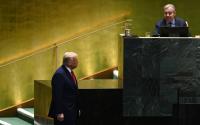9 September 2007Brisbane Times
Prime Minister John Howard has defended APEC leaders' aspirational goals on climate change, saying it was unrealistic and ignorant to expect countries like China to accept binding greenhouse targets.
Mr Howard hailed the weekend's Sydney Declaration as a "highly significant" step involving the world's biggest polluters which continues the process towards a post-Kyoto accord on global warming.
In the declaration, APEC leaders agreed to work towards an aspirational goal in energy intensity and encouraged members to set their own greenhouse goals and action plans.
It's understood that the wording was finalised on Friday after months of negotiations, with China the last country to agree.
"I can understand the reluctance of the Chinese to commit themselves to specific binding targets but that doesn't mean that sometime in the future that may not happen," Mr Howard told reporters at the summit's conclusion.
"It was unrealistic to expect that out of this meeting you would have a commitment to binding targets," he said.
"Those who set that goal were either ignorant to what is achievable or setting those goals for purely political reasons without any regard to the merits of what is involved."
The prime minister expressed hope the agreement would lead to further progress at coming climate change meetings in Washington and Bali.
"It did represent for the first time the Americans and the Chinese having something to say about an aspirational goal.
"I don't want to overstate it, but it is a step forward."
Mr Howard's colleagues were less cautious in praising the declaration.
"This is the first occasion ever that China, which is becoming the world's biggest CO2 emitter, has agreed to any notion of targets at all for developing countries as well as developed countries," Foreign Minister Alexander Downer told Network Ten.
"That is, by the way, an enormous diplomatic breakthrough."
Deputy Prime Minister Mark Vaile went further, saying history would record Sydney as the turning point on the climate change issue globally.
The specific aspirational goal agreed to by the leaders was to work towards achieving an APEC-wide cut in energy intensity of at least 25 per cent by 2030 with 2005 as the base year.
Energy intensity targets calculate greenhouse gas reductions in proportion to economic growth, meaning emissions can still rise while the goals are met.
"They allow politicians to talk in apparently high numbers ... but will actually see emissions continue to grow only slightly slower than they otherwise would, when they need to be coming down rapidly," Australian Greens climate change spokeswoman Christine Milne said.
The Australian Conservation Foundation said APEC could reach the energy intensity target 13 years ahead of the target without changing policies, and China's existing goal was more demanding.
"The weakness of the APEC Sydney declaration is a sober reminder to Australia that being one of only two developed countries refusing to ratify Kyoto carries the high cost," executive director Don Henry said.
But the APEC statement had its champions in the resources industry.
"The underlying failure of the Kyoto Protocol is its focus on targets not solutions," Minerals Council of Australia chief executive Mitch Hooke said.
"The Sydney Declaration adds the critical dimension of considering emission reduction targets through the prism of practical solutions within a market-based framework to managing climate change."






